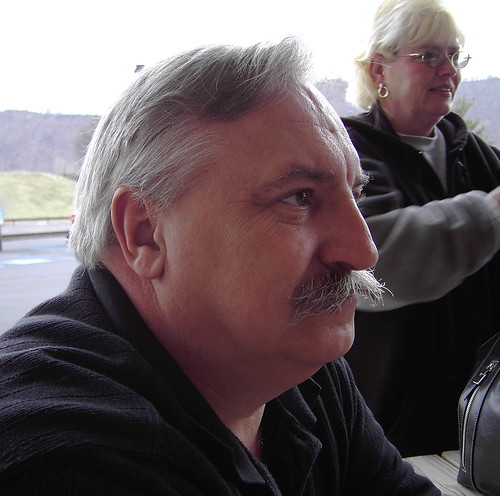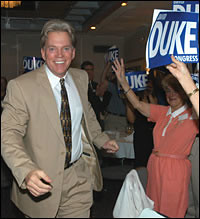
I recently had a long talk with Harold Daub, who once was and has recently become again, at least temporarily, a central figure in Portsmouth’s political history. A nearly forgotten victim of a “mauling” by the Chamber of Commerce crowd twenty-five years ago, in which the Ku Klux Klan may have played an important role, he and two other former councilmen, now deceased, have reemerged as political heroes who stood up to those who were then – and some of whom still are – running and ruining the city.
Twenty-five years ago, in 1980, the Chamber of Commerce crowd portrayed Daub as one of the three villains who had aborted “the Portsmouth Mall” before it had even been born. The three councilmen – Daub, Mark Price, and Andrew Clausing – were accused of having killed Portsmouth’s prospects for prosperity. The Chamber of Horrors crowd claimed there was just this one window of opportunity for a mall and the three councilmen had closed it. Yes, we are supposed to believe that chance could never come again, even though the three councilmen were recalled after only six months in office and replaced by pro-mall members and a pro-mall city manager, Richard Roberts. A casket with Daub, Price and Clausing’s blown-up photographs on it was carried down Chillicothe Street. Mark Price charged that the photographs of the councilmen had been supplied to the demonstrators by the Portsmouth Daily Times, where JoAnn Aeh, according to several sources, was employed. Whether she was or not, she was active in the movement to recall the three councilmen. Her husband Roy Aeh was active in the Ku Klux Klan, which may have something to do with the casket being adorned with crosses, a favorite KKK symbol, with the word ”Murderers” scrawled on one of them. Later, a group of figures with bed sheets over their heads appeared outside the homes of Daub and Clausing at night, Ku Klux Klan style, to deliver a message of hate.
Mark Price wrote a letter-to-the-editor of the Portsmouth Times in 1987, when Feldman’s successor as City Manager, Richard Roberts, was forced out of office. Price wrote, “The uproar over Barry Feldman resulted from the chase of an elusive dream. Feldman and his supporters led everyone to believe that he was going to deliver a $50-million downtown mall. The truth is that no mall was ever going to be built. There is proof of that now. The whole idea was just a scheme to keep Feldman in office and possibly to enrich some landowners at the expense of taxpayers.”
I asked Daub if in the last quarter of a century he had ever thought of moving away from Portsmouth. He said he had, many times. One of those times may have been when his son was discriminated against in school. An unforgiving mother allegedly baked cupcakes for everyone in his class except him. He was denied a cupcake because he was the child of the notorious Mall-Killer. Even though Daub never got over the sense that he was a marked man, and that there were still people in the city who had never forgotten or forgiven him or his family, he remained in Portsmouth, because that’s where his roots are.

Harold Daub in 2005 with his wife Darlene
Daub told me the Mall was only “a smokescreen.” (Several well-informed conservative senior citizens I know who still remember the 1980 events share that view.) What they were really after, Daub told me, was not a mall but a public university. The crooked crowd who controlled the city would have preferred both a mall and a university, but there was not enough room in downtown Portsmouth for both, and a mall would require private capital, which Portsmouth with its shrinking population and depressed economy would have a hard time raising. Federal money would be available, of course, but it alone would not be enough to build a mall. Persuading a major department store chain to provide an anchor store for a Portsmouth mall would have been almost as hard as persuading the Detroit Lions, who had started out in Portsmouth in the 1930s, to move back and play in Spartan Stadium.
Daub told me he traveled to Cleveland to talk to the developer of the proposed mall, and he came away from that meeting convinced that this particular mall was not going to be built, that what Riffe and the Chamber of Commerce crowd were really doing was laying the groundwork, literally, for a public university, which would be a more effective engine for urban renewal than a mall because the state government would pay for almost all of it. What with abatements and an ordinance that authorized the taking of property by eminent domain to make way for the university, a lot of money could and eventually was made by those dealing in real estate in the downtown area. Why enter a fiercely competitive market like retail merchandising when the Speaker could deliver a pork project for Portsmouth?
Daub insists he, Price, and Clausing were not opposed to a mall, per se. They were opposed to the phony mall that was being used as a smoke screen. But the city manager, Barry Feldman, didn’t see it that way because he was, in Daub’s view, a tool of the Chamber of Commerce. In his letter-to-the-editor, Mark Price characterized Feldman as someone who had a “gift for glib gab, [but] had no idea how to conduct Portsmouth municipal government.” Under the city manager form of government, which was then in place, the City Council had the power to fire the City Manager, and that’s what the City Council did, voting 4-2 against Feldman. But Feldman remained in office. The Citizens for Good Government, whom Price called “political gangsters,” saw to that. The City Manager form of government is as corruptible by the Chamber of Commerce crowd as the mayoral system.
Because Feldman was Jewish, one of the charges made against Daub, Price, and Clausing was that they were anti-Semitic. Two Portsmouth radio stations aired editorials that strongly implied that the councilmen opposed Feldman because he was Jewish. Mark Price told a Portsmouth Times reporter that his opposition to Feldman had nothing to do with his being Jewish but everything to do with his failed policies and incompetent style of management. Daub’s ancestors had been in Portsmouth for hundreds of years, but because they were part of Portsmouth’s German-American community, Daub was especially vulnerable to the charge of anti-Semitism, particularly when some of those making the charge included prominent Jewish members of the community. Daub claims he had no idea that Feldman was Jewish until he was accused of anti-Semitism.
One of the great ironies of the anti-Semitism charge (and the charges of being anti-Catholic and anti-Black) was that JoAnn Aeh, one of those active in the campaign to recall Daub, was married to a Ku Klux Klan member, Roy Aeh, according to a copy of a letter from the KKK to Aeh that Daub has had in his possession for a quarter of a century.
The Ku Klux Klan had swept across the country in two waves. In the first wave, from shortly after the Civil War to about the late 1890s, the KKK was a tightly controlled, hierarchal, extremely influential and secretive organization operating largely in the South. The first wave of the KKK was determined to stop Catholics, Jews, and above all Negroes, from polluting white Protestant America. The second wave of the KKK, which arose in the early 1900s, was loosely organized, fragmented, less influential, and increasingly focused on Jews as the main threat to White Anglo-Saxon Protestants, known as WASPS.
One of the most notorious leaders of the second wave of the KKK was a Southerner, from Louisiana, David Duke, but the states which the second wave of the KKK washed over were in the Midwest. Indiana was one of those states and Ohio another. The KKK was apparently active in Ohio in the late 1970s. Daub and others I have talk to recall the KKK demonstrating in downtown Portsmouth around 1978. Whether JoAnn Aeh’s husband was a demonstrator, or whether he was one of those recruited by the KKK demonstrators, perhaps only she and her husband can say. In any event, David Duke sent a letter to Roy Aeh (29 April 1978) congratulating him on his induction into the Knights of the Ku Klux Klan. Duke wrote, “I know you share our fear that our beloved nation is slowly being brought within the grasp of the Niggers, Jews, Catholics and Puerto Ricans.” In closing his letter, the Grand Dragon extended an invitation to the Aehs. “You and your wife JoAnn are cordially invited to be with us in this great crusade,” the Crusade for White Supremacy.

David Duke campaigning for Congress and for White Supremacy
I recently twice visited JoAnn Aeh at the City Clerk’s office trying to clear up the murky real estate collaboration between the city and Neal Hatcher on the Campus View housing units. On my first visit she said the City at no time had title to any of the land on which Campus View housing had been built, even though I told her records at the County Courthouse showed that the City had. She made a quick search of her records and said she found no evidence of such a connection. I then went back to the Courthouse and obtained photocopies of deeds that showed the City had acquired property on the northwest corner of 3rd and Waller on December 2, 2002, and transferred it immediately to Hatcher. She acknowledged that the county records proved my point, but she confessed to feeling somewhat mystified since she could find no ordinance that showed the City had ever acquired the property. She quipped as I left her office, “Please let me know if I can not help you again.” She was kidding, of course, but John Welton has said that getting information from JoAnn Aeh about anything is very difficult, if not impossible. However, her and her husband’s connection with the Ku Klux Klan is no joking matter. And she should make a public explanation. Not only Harold Daub and his family but many others in Portsmouth deserve an explanation. African-American and Jewish citizens in particular deserve to know.
What was JoAnn Aeh’s role in the past? What did she and the Ku Klux Klan have to do with the mauling of Harold Daub, Mark Price, and Andrew Clausing, and, more importantly, what is her role now? In most communities outside of the deep South, a letter like the one the Grand Dragon David Duke sent to the Aehs would kill anyone’s chances of a political career or even government employment. But she was appointed to the City Council, in 1983, representing the 2nd Ward, and continued in that position in 1984 and 1985, and she was subsequently hired as City Clerk, a position that was changed from part-time to full-time and which she has held for many years. Instead of being held accountable for her association with the KKK, she has possibly been rewarded for her valuable services to the Chamber of Commerce crowd, one of which services may be stonewalling those looking for information about city real estate shenanigans and another of which may have been the 1980 mauling of Harold Daub.